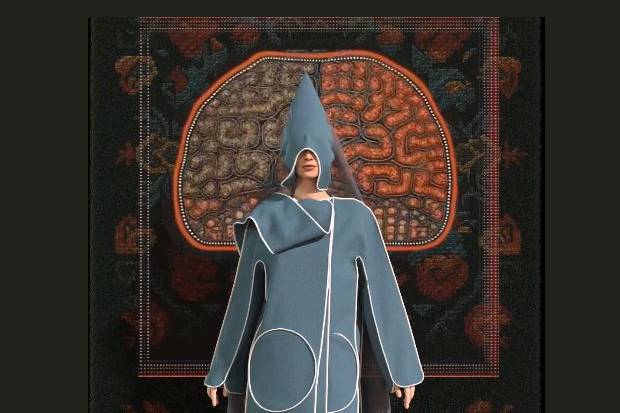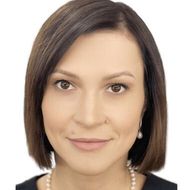HSE University and Adyghe State University Launch Digital Ethnolook International Contest

The HSE Centre for Language and Brain and the Laboratory of Experimental Linguistics at Adyghe State University (ASU) have launched the first Digital Ethnolook International Contest in the Brain Art / ScienceArt / EtnoArt format. Submissions are accepted until May 25, 2024.
Contest participants are encouraged to explore the concept of the ethnocultural code through artistic expression, drawing upon insights from cognitive science, linguistics, and neuroscience.
The aim of the contest is to create an artistic representation (for clothing, accessories, or prints) that communicates the cognitive dimension through visual elements (such as images of the brain, neural networks, etc.), showcasing the aesthetic potential of neuroscience, neurobiology, and neurolinguistics.
'The brain of a native speaker of a language, especially one fluent in multiple languages, can serve as a wellspring of inspiration. The worldview of individuals from a specific linguistic and cultural community reflects a distinct mentality that can be expressed through imagery, symbols, and colour,' comments Professor Olga Dragoy, Director of the HSE Centre for Language and Brain.
The contest is held in the framework of the Ethnomoda International Contest, whose permanent chairman is Alexander Khilkevich, trend analyst, co-founder of the National Academy of Fashion Industry, and founder of the Best Russian Designers Ranking.

Susanna Makerova
'This time, the aesthetics of neurobiology, the unique worldview of individuals from specific linguistic and cultural backgrounds, as well as culturally significant language expressions including phrases, sayings, and proverbs with an ethnocultural component, can serve as sources of inspiration for contest participants,' says the author of the project Professor Susanna Makerova, head of the ASU Laboratory of Experimental Linguistics.
The contest comprises three nominations:
3D Model—a digital portrayal of an avatar within an environment (static renders or a video clip of up to a minute)
Ornamentation (digital sketches or AI generated designs)
Accessories (sketches or 3D visualisations)
Prizes for winners include: an online course from the 3D Couture school, participation in EtnomodaArtCommunity multimedia exhibitions in Russia and CIS countries, publication of the top creations in the Digital Shkaf Telegram channel and Ethnomoda Project's social media.
To participate, please send an email to artroom.suziem@gmail.com with an application stating the author's name, creative director, and a link to social networks (if applicable), along with details such as place of study or work, city, and country. Please submit each entry in a separate email.
Requirements for submitted works: images in JPEG or PNG format, videos in MP4 format, and the file names must include the first and last name of the author.
The submission deadline is May 25, 2024.
The contest is conducted with support from the HSE Centre for Language and Brain, the ASU Laboratory of Experimental Linguistics, the Ministry of Culture of the Republic of Adyghe, Adyghe State University, the Academy of Architecture and Arts at Southern Federal University, the State Museum of Applied Arts and the History of Handicrafts of Uzbekistan, the All-Russian Museum of Decorative Arts, the Mikhail Shemyakin Centre, 3D Couture, U magazine, FashionTechPermCommunity, and EtnomodaArtCommunity.
See also:
Researchers Identify Link between Bilingualism and Cognitive Efficiency
An international team of researchers, including scholars from HSE University, has discovered that knowledge of a foreign language can improve memory performance and increase automaticity when solving complex tasks. The higher a person’s language proficiency, the stronger the effect. The results have been published in the journal Brain and Cognition.
‘Engagement in the Scientific Process’: HSE Launches Master’s Programme in Neurobiology
The HSE University Academic Council has elected to launch a new Master's programme in Neurobiology for students majoring in Biology. Students of the programme will have access to unique equipment and research groups, providing them with the knowledge and experience to pursue careers in science, medicine and pharmacy, IT and neurotechnology, and education and HR services.
Scientists Discover That the Brain Responds to Others’ Actions as if They Were Its Own
When we watch someone move their finger, our brain doesn’t remain passive. Research conducted by scientists from HSE University and Lausanne University Hospital shows that observing movement activates the motor cortex as if we were performing the action ourselves—while simultaneously ‘silencing’ unnecessary muscles. The findings were published in Scientific Reports.
Russian Scientists Investigate Age-Related Differences in Brain Damage Volume Following Childhood Stroke
A team of Russian scientists and clinicians, including Sofya Kulikova from HSE University in Perm, compared the extent and characteristics of brain damage in children who experienced a stroke either within the first four weeks of life or before the age of two. The researchers found that the younger the child, the more extensive the brain damage—particularly in the frontal and parietal lobes, which are responsible for movement, language, and thinking. The study, published in Neuroscience and Behavioral Physiology, provides insights into how age can influence the nature and extent of brain lesions and lays the groundwork for developing personalised rehabilitation programmes for children who experience a stroke early in life.
Scientists Uncover Why Consumers Are Reluctant to Pay for Sugar-Free Products
Researchers at the HSE Institute for Cognitive Neuroscience have investigated how 'sugar-free' labelling affects consumers’ willingness to pay for such products. It was found that the label has little impact on the products’ appeal due to a trade-off between sweetness and healthiness: on the one hand, the label can deter consumers by implying an inferior taste, while on the other, it signals potential health benefits. The study findings have been published in Frontiers in Nutrition.
Internal Clock: How Heart Rate and Emotions Shape Our Perception of Time
Our perception of time depends on heart rate—this is the conclusion reached by neuroscientists at HSE University. In their experiment, volunteers watched short videos designed to evoke specific emotions and estimated each video's duration, while researchers recorded their heart activity using ECG. The study found that the slower a participant's heart rate, the shorter they perceived the video to be—especially when watching unpleasant content. The study has been published in Frontiers in Psychology.
Scientists Develop New Method to Detect Motor Disorders Using 3D Objects
Researchers at HSE University have developed a new methodological approach to studying motor planning and execution. By using 3D-printed objects and an infrared tracking system, they demonstrated that the brain initiates the planning process even before movement begins. This approach may eventually aid in the assessment and treatment of patients with neurodegenerative diseases such as Parkinson’s. The paper has been published in Frontiers in Human Neuroscience.
HSE Scientists Test New Method to Investigate Mechanisms of New Word Acquisition
Researchers at the HSE Centre for Language and Brain were among the first to use transcranial alternating current stimulation to investigate whether it can influence the acquisition of new words. Although the authors of the experiment have not yet found a link between brain stimulation and word acquisition, they believe that adjusting the stimulation parameters may yield different results in the future. The study has been published in Language, Cognition and Neuroscience.
When Thoughts Become Movement: How Brain–Computer Interfaces Are Transforming Medicine and Daily Life
At the dawn of the 21st century, humans are increasingly becoming not just observers, but active participants in the technological revolution. Among the breakthroughs with the potential to change the lives of millions, brain–computer interfaces (BCIs)—systems that connect the brain to external devices—hold a special place. These technologies were the focal point of the spring International School ‘A New Generation of Neurointerfaces,’ which took place at HSE University.
How the Brain Responds to Prices: Scientists Discover Neural Marker for Price Perception
Russian scientists have discovered how the brain makes purchasing decisions. Using electroencephalography (EEG) and magnetoencephalography (MEG), researchers found that the brain responds almost instantly when a product's price deviates from expectations. This response engages brain regions involved in evaluating rewards and learning from past decisions. Thus, perceiving a product's value is not merely a conscious choice but also a function of automatic cognitive mechanisms. The results have been published in Frontiers in Human Neuroscience.



